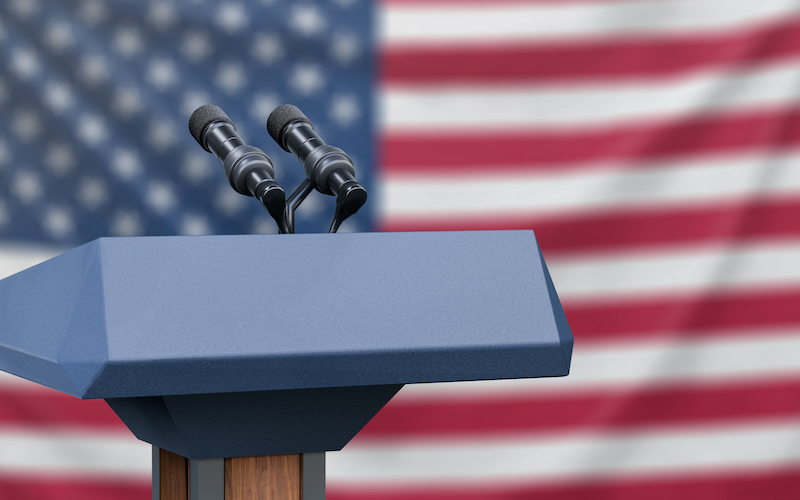
President Trump’s reactions to Supreme Court decisions threaten the legitimacy of the nation’s judicial system.
Abortion. Religious liberty. Gender identity. Immigration. Presidential power. These are but some of the consequential issues the U.S. Supreme Court decided this past year.
But the Court’s decisions are not the only noteworthy aspect of the Supreme Court’s 2019-2020 term. Another remarkable, albeit troubling, aspect of the Supreme Court’s recent term had nothing to do with the Court itself. It had to do with President Donald J. Trump’s reactions to some of the Court’s decisions that did not turn out the way the President would have liked.
Rather than responding in a measured and respectful manner to adverse decisions, as previous Presidents have done, President Trump resorted to making what could fairly be described as snide digs directed at the Court. Consider a sampling of comments from his Twitter account:
- “These horrible & politically charged decisions coming out of the Supreme Court are shotgun blasts into the face of people that are proud to call themselves Republicans or Conservatives.”
- “The Justices ‘punted,’ much like in a football game (where hopefully they would stand for our great American Flag).”
- “The DACA decision … a highly political one, and seemingly not based on the law.”
- “The recent Supreme Court decisions, not only on DACA, Sanctuary Cities, Census, and others, tell you only one thing, we need NEW JUSTICES of the Supreme Court.”
- “Do you get the impression that the Supreme Court doesn’t like me?”
- “Courts in the past have given ‘broad deference’. BUT NOT ME!”
Maybe these comments should be taken neither literally nor seriously. Or perhaps President Trump was simply “using sarcasm.” Even so, presidential rhetoric matters. When the nation’s chief executive implies that the Court has made its decisions based on politics, or suggests that the Justices have personal animus toward him, he risks undermining public confidence—not only in the Court, but potentially in the entire U.S. legal system.
Perhaps some readers may find these particular statements by President Trump rather muted, at least for him. After all, the President has said far worse about Democrats or others he sees as his political opponents. That may be so, but it does not mean that presidential words about the Court have no effect. Indeed, if his comments about the Court seem somewhat mild, that in itself suggests that his rhetoric may already be having an effect on the public: a numbing effect.
President Trump’s criticisms may no longer seem outlandish or inappropriate because he frequently uses this type of language. He has made digs at specific judges and courts throughout his time in office.
Last year, President Trump responded angrily to the Supreme Court’s decision in Department of Commerce v. New York. In that case, the Court held that the U.S. Secretary of Commerce had not provided a good faith rationale for incorporating a citizenship question into the biennial census.
Tweeting in response, the President said the Court’s decision “seems totally ridiculous.” He asked, “Can anyone really believe that as a great Country, we are not able the ask whether or not someone is a Citizen. Only in America!”
Later, when asked about the Court’s decision at a press conference, he said:
It was a very strange decision. It was a very, very sad decision. Not in terms of voting. Not in terms of—just a very sad because it was so convoluted. It was—to get to that decision, had to be very, very hard.
And when a reporter asked him to comment further on the case, claiming that the “justices said that your guys were playing politics when deciding not to count noncitizens,” President Trump replied, “Hey, who’s really playing politics, okay? Check it out. You tell me who’s playing politics.”
In addition to his comments about Supreme Court decisions, the President has also asserted that a lower court federal judge who ruled against the Administration was just an “Obama judge.” That statement prompted Chief Justice John Roberts to remind the public that the courts have no “Obama judges or Trump judges, Bush judges or Clinton judges”—just an “extraordinary group of dedicated judges doing their level best to do equal right to those appearing before them.” But President Trump only doubled down, saying, “Sorry Chief Justice John Roberts, but you do indeed have ‘Obama judges,’ and they have a much different point of view than the people who are charged with the safety of our country.”
President Trump has also said that the United States Court of Appeals for the Ninth Circuit is a “disgrace.” He has referred to a federal district court judge as a “so-called judge.” He sought to disparage yet another federal judge by saying, “He’s a Mexican judge”—even though the judge was born in Indiana. The President also said that same federal judge was “a hater of Donald Trump, a hater. He’s a hater.”
President Trump’s string of disparaging remarks is not how Presidents have typically spoken about judges and court decisions. Even President Richard Nixon, after losing a unanimous Supreme Court decision over access to the Watergate tapes, issued a measured response: “While I am of course disappointed in the result, I respect and accept the Court’s decision.” He added that he had told his attorney “to take whatever measures are necessary to comply with that decision in all respects.”
This is not to say that Presidents have never criticized Supreme Court decisions. President Obama publicly discussed his disagreement with the Supreme Court’s decision in Citizens United v. Federal Election Commission. But President Obama expressed substantive concerns over the repercussions of the Court’s decision for a fair electoral process. In his State of the Union remarks, he said, “With all due deference to separation of powers, last week the Supreme Court reversed a century of law that I believe will open the floodgates for special interests–including foreign corporations—to spend without limit in our election.”
Nothing in President Obama’s criticism of Citizens United attacked the justices personally nor implied they were acting in a political manner.
Likewise, even President Franklin Delano Roosevelt, in announcing his “court-packing” plan in 1937, couched his rhetoric neutrally—albeit surely disingenuously—around the goal of improving the efficiency of the courts. He made his case for reform using data on the number of lawsuits and the duration of case processing.
President Trump, by contrast, engages in no meaningful substantive discourse about judicial decisions. The courts are wrong, it seems, simply because they disagree with him.
As a nominee for the Supreme Court, then-Judge Neil Gorsuch declared such attacks on the integrity of judges to be “disheartening” and “demoralizing.” Over time, such rhetoric by any President is likely also to damage public respect for the legal system. Social science research shows that repeated political attacks over the Supreme Court can undermine its public legitimacy.
Granted, President Trump’s verbal attacks on the courts will not affect everyone in the same way. The President’s digs at the courts will not influence his critics’ views of the Supreme Court’s legitimacy as easily as they will influence the views of his supporters. But those supporters still make up a sizeable proportion of the public.
Moreover, repeated exposure to incivility by a President might coarsen the broader public’s views to some degree as well. Members of the public on either end of the political spectrum may become more likely to see the courts as a “disgrace” whenever judges reach outcomes that disagree with partisan positions.
In the end, that would be a tragic outcome, although one with a touch of irony. It would be tragic because well-earned public respect for a judicial system is an important component of a well-ordered, just society. It would be ironic, though, because President Trump and Senate Republicans seem to rejoice in having filled a large number of seats on the federal bench over the last four years, presumably because they think these judges will act more like “Trump judges.” Yet at the same time, these new judges—and the judiciary overall—may receive a diminished level of deference and respect from the public, precisely because of the steady drumbeat of politicized disparagement by the President himself.
Whether serious or sarcastic, presidential rhetoric can damage both national civility and public perceptions of governmental legitimacy. The decisions that the Supreme Court handed down this past year will have an impact on the law for years to come. But so too, unfortunately, might the President’s reactions to those decisions.
This essay is part of a series entitled The Supreme Court’s 2019-2020 Regulatory Term.




